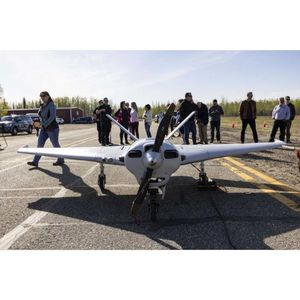The Federal Aviation Administration has granted a regulatory waiver to the University of Alaska Fairbanks unmanned aircraft systems test site.
The agency’s decision supports aircraft manufacturers and operators in proving the safety of their drones so they can be certified for flight in the national airspace system.
The Alaska Center for Unmanned Aircraft Systems Integration, ACUASI, a unit of the UAF Geophysical Institute, manages and operates the test site. ACUASI has become a national leader in implementing the safe operation and integration of unmanned aircraft.
UAF is one of seven FAA-designated unmanned aircraft systems test sites established to develop and test drone technology. It has numerous flight test areas around the country.
“We were just handed a tool to help aircraft manufacturers get their drones certified for use,” ACUASI Director Cathy Cahill said.
“The FAA is allowing the test site to test and evaluate larger drones under real-world conditions,” she said. “This will allow us to support the development of a strong drone economy in Alaska and across the nation.”
Cahill received the lengthy letter detailing the four-year waiver Monday from Caitlin Locke, acting executive director of the FAA’s Flight Standards Service.
The FAA’s decision came just over two years after the state requested the waiver. Gov. Mike Dunleavy, U.S. Sens. Lisa Murkowski and Dan Sullivan, and the Alaska Department of Transportation and Public Facilities voiced their support for the waiver so that industry could conduct research and development testing with minimal paperwork.
This waiver covers a variety of research and developmental operations. It applies to unmanned aircraft that weigh under 300 pounds.
Previously, applicants seeking to conduct these operations were required to go through a lengthy process of applying for a special airworthiness certificate and to petition for exemption to various regulations. Both are time consuming and resource-intensive for the FAA and the applicant.
Under terms of the waiver, ACUASI will be responsible for assessing the airworthiness of a customer’s unmanned aircraft and its procedures. They will use their own internal processes to determine whether a customer’s unmanned aircraft operation can be conducted safely.
ACUASI will have control of all operational aspects under the waiver.
“[T]he FAA finds that these operations are consistent with aviation safety because they occur in defined remote locations, which have been evaluated by the Air Traffic Organization to minimize exposure to people and property,” the letter reads.
The letter adds that the Alaska Test Site “has infrastructure in place to support the safe operations” of unmanned aircraft systems and to handle emergencies. It notes that ACUASI has “fixed and mobile command centers with surveillance feeds and connections to airport rescue and firefighting services.”
“The FAA entrusted ACUASI with this waiver as a result of years of conducting safe public aircraft operations under similar regulatory conditions,” Cahill said. “This waiver now allows our civil customers to conduct testing and evaluation of aircraft beyond pure aeronautical research.
“We are grateful for our long-lasting partnership with the FAA that gave us another tool for use in our effort to safely integrate unmanned aircraft into the national airspace system,” she said.
ACUASI achieved a historic milestone in 2022 when one of its unmanned aircraft flew from Fairbanks International Airport in controlled airspace. The flight was the first civilian large drone operation from an international airport in Alaska.
ACUASI owns a variety of unmanned aircraft, as well as ground control stations, antennae, generators and accessories. It has the ability to deploy anywhere in the world.
The center also owns unmanned aircraft system payloads, including detect-and-avoid systems (ground-based and airborne), anti-GPS jamming systems, electro-optical/infrared cameras, lidar systems, methane detectors, aerosol samplers and more.
 Unmanned Aerial Vehicle The latest drone news
Unmanned Aerial Vehicle The latest drone news




